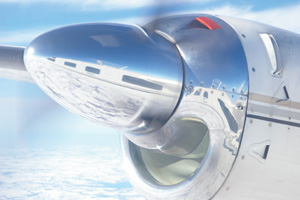What To Do In the Event of
Prop Shaft Decoupling


By Helmuth Eggeling
In April 2011 I will be at the Twin Commander University in Bonita Springs, Florida, to present my �Flying the Engine� seminar. At past Universities I have talked about operating tips for the TPE331 engine, but this year I plan to focus on two important but little-understood aspects of operating a direct-drive turboprop engine: Beta versus Prop Governor modes, and Prop Shaft Decoupling.
The latter topic is the subject of a Honeywell Operating Information Letter (OIL) that was issued March 2, 2010. The OIL (OI331-26) was written to describe the purpose of the OI, discuss the uncoupling scenario, list approximate engine parameters during an uncoupling event, and provide generic actions the pilot should follow upon identifying an engine uncoupling.
OI331-26 applies to all owners/operators, airframe manufacturers, distributors, sales and service organizations, and field service representatives for aircraft powered by TPE331 engines. It applies to all TPE331 models. The text of the OIL follows.
The purpose of this Operating Information Letter is to provide a description of the engine symptoms and recommended actions in the event of an uncoupling event. An uncoupling scenario is defined as a disengagement of any of the engine gearbox components that make up the gear reduction drive from the ring gear support to the splined propeller shaft coupler. This separation typically occurs while the engine is at higher torque levels, but may also occur at lower torque levels.
This OIL is not intended to be used in lieu of the applicable aircraft manuals. If these recommendations conflict with aircraft manual procedures, Honeywell recommends you contact the aircraft OEM for clarification.
WARNING:In the event of an uncoupling event where the engine is operating and the propeller is stopped and feathered, retarding the power level to flight idle may result in the unfeathering and subsequent rotation of the propeller. If this occurs, advance the power level to the maximum position.
DISCUSSION
The propeller of an engine that has experienced an uncoupling scenario will move quickly toward feather until the feather stop position blade angle is reached; at the same time, the engine will accelerate to the Overspeed Governor (OSG) set point of approximately 104 percent RPM and remain at that speed until the engine is shut down.
Typical propeller and engine parameters following an uncoupling event:
- Propeller blades: Feathered
- Engine speed: 104 percent RPM (approximate)
- Torque: 0 percent (approximate)
In the event of an engine uncoupling, the pilot should follow the emergency engine shut down and securing procedures in accordance with the FAA approved Aircraft Flight Manual.
Note: Prior to performing the emergency shutdown procedure. advancing and maintaining the Power Lever (PL) of the affected engine to the full forward position will ensure the availability of beta follow-up and that the propeller blades will remain in the feathered position.
Movement of the PL to the maximum forward position following the uncoupling event does not change the operating parameters of the engine. However, reducing the PL after a decouple event may cause the propeller to come out of feather, slew toward the low pitch stop, and begin rotating which, depending upon the airspeed of the airplane during the event, could result in a propeller overspeed (greater than 100 percent propeller speed). The potential of a propeller overspeed can be avoided by advancing and maintaining the power lever fully forward until the engine has been shut down. For further assistance, contact your Honeywell Field Service Representative or the Honeywell Technical Operations Center at 800-601-3099 (U.S.) or 602-365-3099 (international).
For further assistance on this or any other TPE331 engine operational issues, please contact the Honeywell Pilot Advisor Group, phone 602-231-2697 or e-mail [email protected].
Discuss this article in the forums...






